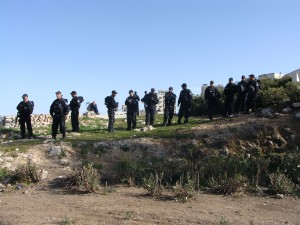 The Huffington Post, May 21, 2010
The Huffington Post, May 21, 2010
I’m not sure I should be saying this publicly, but I’ve not been writing much lately because I’ve been in a bit of a depression.
A political depression, that is. Interviews, research, press releases, and headlines pile on top of me, one after another, leaving me heavy and defeated. Two Palestinian-Israeli activists were arrested and, initially, news of their detainment was gagged. As proximity talks began Prime Minister Benjamin Netanyahu proclaimed, on Jerusalem Day, that building will continue in Jerusalem and that the capital will remain “united.” And, in annexed East Jerusalem, Palestinians receive appallingly few services from the “unified” municipality.
Sometimes, I feel so thick with it all I can’t find the strength to write about it.
I mull over everything, trying to figure out the tipping point, the moment I started to feel hopeless. Was it the Gazan who was shot and killed during a protest against the buffer zone that deprives farmers of much-needed land? Is it the plight of African refugees in Israel? Was it the most recent arrests at Sheikh Jarrah?
No.
My political depression goes back to the Jerusalem café where, as I was chatting with a stranger, a Jewish Israeli about my age, I mentioned that I write for several Arab publications. “Which side are you on?” he asked me. “Are you with the Jews or the Palestinians?” When I hesitated, he demanded that I answer. When I said, “Both,” he demanded that I choose.
It goes back to the elderly Palestinian gentleman I met in Ramallah. Elegant, refined, dressed in a grey suit, he told me “Go back to Germany,” a place my family, in all its wandering, has never lived.
It goes back to the Jewish Israeli left-winger, himself a son of immigrants. Sitting outside of a Tel Aviv bar, he confessed to me that he thinks Russians shouldn’t be allowed in the country. “They’re only here for the money,” he said.
It goes back to the daughter of Russian immigrants who, although she was born and raised in Israel, felt compelled to tell me that her parents are Zionists who moved here for ideological reasons. “My parents came in the 70s, before the rest of them,” she said, referring to the Russians who arrived in the 1990s.
It goes back to the young man, a Jewish Israeli fresh out of mandatory army duty, who insists that we can’t live with the Palestinians because, “You’ve been to their villages, right? They’re so primitive.”
It goes back to the Palestinian activist who dismissed the Holocaust and the ghettos and the pogroms and the persecutions by saying, “If you were to compress all of the suffering of the Jews into one volume, it might come close to what has happened to the Palestinians in the past 60 years.” But Palestinians have suffered more, she insisted. I wondered how comparing our scars would help.
It goes back to the Israeli woman, the daughter of a Holocaust survivor, who tells me that Jews and Arabs can’t live together. How has she forgotten that, prior to 1948, Jews fared better in the Arab world than they did in Europe? Why doesn’t she remember that this idea of “we can’t live together” almost killed her mother?
It goes back to the same woman who said she doesn’t want to live with “them” because Palestinian men don’t treat women well.
It goes back to an American Jewish friend who, after we’d seen an anti-Semitic movie in a Cairo theatre, refused to use his Arabic to help someone sitting on the sidewalk crying. “Ask him what’s wrong,” I said. “Ask him if he’s OK.” My friend, shaking with anger, answered, “I don’t care.”
It goes back to all the moments when we don’t see each other’s humanity.
***
When I finished a draft of this yesterday, I turned to another writer for help. “End on a positive note,” he said.
How? I wondered. I read over what I’d laid down here, looking for a thread to pull out, a missed opportunity. I checked the news, looking for a headline, some sudden development that would lift my mood and this story.
But I couldn’t figure out how to knit a little hope into the ending. So I slept on it.
In the morning, I knew.
It goes back to the writer. A Palestinian refugee, he was born and raised in Gaza. He lived under the occupation. Today, he believes Arabs and Jews can live together. “End on a positive note,” he says.
Photo: Mya Guarnieri. An excessive number of police await the weekly, non-violent protest at Sheikh Jarrah.